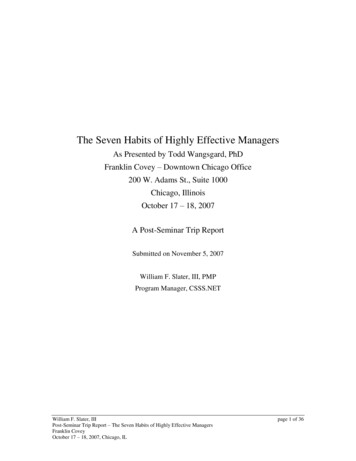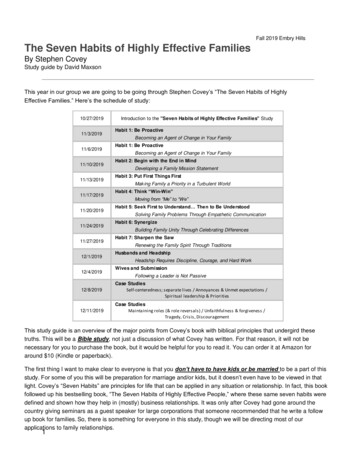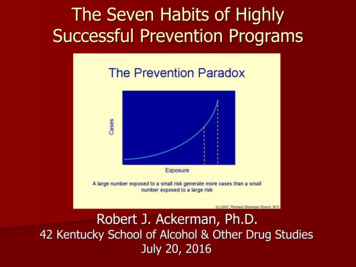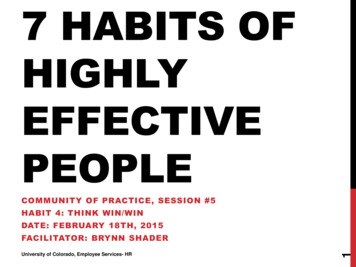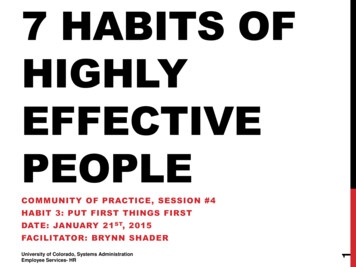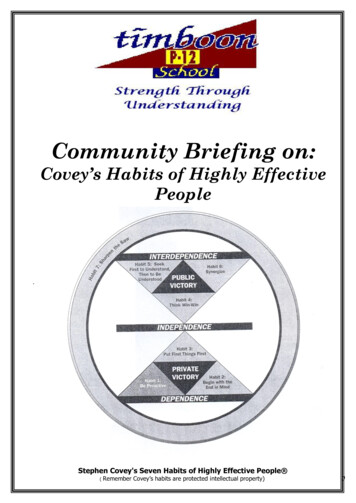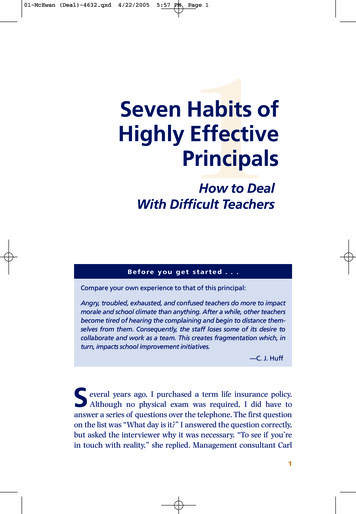
Transcription
01-McEwan (Deal)-4632.qxd4/22/20055:57 PMPage 11Seven Habits ofHighly EffectivePrincipalsHow to DealWith Difficult TeachersBefore you get started . . .Compare your own experience to that of this principal:Angry, troubled, exhausted, and confused teachers do more to impactmorale and school climate than anything. After a while, other teachersbecome tired of hearing the complaining and begin to distance themselves from them. Consequently, the staff loses some of its desire tocollaborate and work as a team. This creates fragmentation which, inturn, impacts school improvement initiatives.—C. J. HuffSeveral years ago, I purchased a term life insurance policy.Although no physical exam was required, I did have toanswer a series of questions over the telephone. The first questionon the list was “What day is it?” I answered the question correctly,but asked the interviewer why it was necessary. “To see if you’rein touch with reality,” she replied. Management consultant Carl1
01-McEwan (Deal)-4632.qxd2 4/22/20055:57 PMPage 2How to Deal With Teachers . . .Frost of the Scanlon Leadership Network (2003) is well known forasking the same question of his corporate clients to remind themto stay alert regarding what’s happening in their organizations.“Wake up and face reality,” is his message. Difficult teachers arethe reality that many administrators are currently ignoring intheir schools.Troublesome teachers are the proverbial “elephant” in facultymeetings. Everyone knows the elephant is there, but few are willing to confront the beast for fear of getting trampled. Many lowperforming schools (and even some seemingly successful ones) areoverrun with elephants. When the herd comes thundering downthe hallway, everyone disappears, including, in some cases, theprincipal. It’s time to wake up and face these enormous beasts. Ifyou don’t, your school may fail and take you along with it.Before you can deal productively with difficult teachers, youmust first examine your own attitudes and behaviors—the thingsyou habitually think, say, and do. Dealing with difficult teachersdemands that you face your own character flaws before you tacklethose of your teachers. In fact, some teachers have suggestedthat my next book should be titled How to Deal With Principals WhoAre Angry, Troubled, Exhausted, or Just Plain Confused. (Note: For acomprehensive treatise on the topic of principal mistreatment ofteachers, see Blase & Blase, 2003.)We all make mistakes from time to time. I have certainlymade my share of them—especially as a brand-new administrator. Thankfully, there were effective and caring teachers on mystaff who pointed out what I needed to do differently. I listened tothem, albeit with some frustration,Leadership is worth the riskand eventually became a strongbecause the goals extendinstructional leader. In the beginbeyond material gain orning, I was impatient to bring aboutpersonal advancement.change. I had to learn to listen andBy making the lives of peoplewait—postures that did not comearound you better, leadershipeasily to me.provides meaning in life.However, there were problemsIt creates purpose.that couldn’t wait. There were sev—Heifetz and Linsky eral dysfunctional teachers whose(2002, pp. 2–3) problems were long overdue forremediation. With the support of
01-McEwan (Deal)-4632.qxd4/22/20055:57 PMPage 3Seven Habits of Highly Effective Principals 3the superintendent, the district’s legal counsel, and eventually theschool board and teacher’s union, I was able to address thoseissues, not always at the speed I desired, but with solid documentation and respect for due process. While teachers do have rights,they do not include the license to sexually, physically, verbally, andeducationally abuse students. Some of the teachers in my school,those whose skills were the shakiest, believed that I was out toeliminate the entire faculty. There was uncertainty and even fear,but the effective teachers eventually came out from behind closeddoors to embrace both shared leadership and their new principal.They began to see that our goal to raise achievement would onlybe realized when we were united in our expectations and values.SEVEN HABITS FOR DEALINGPOSITIVELY WITH DIFFICULT TEACHERSWhether your goal is to take the lead in reforming a dysfunctionalschool community or to deal with one or two difficult teachers,put the following seven habits of attitude and action into dailypractice:1. Being an assertive administrator2. Being a character builder3. Being a communicator4. Nurturing a positive school culture5. Being a contributor6. Conducting assertive interventions7. Doing it todayEach of these habits is essential to dealing with difficultteachers and, if practiced daily, will strengthen and enhance yourinstructional leadership.Habit 1: Being an Assertive AdministratorAssertiveness is a mindset that impacts the way you communicate (words and body language) and behave (deeds) in your
01-McEwan (Deal)-4632.qxd4 4/22/20055:57 PMPage 4How to Deal With Teachers . . .everyday (habitual) interactions with teachers. It is a positive,forthright approach to leadership that stands in stark contrast toless effective leadership styles characterized by either aggressiveness orThe most effective way to dealhesitancy.with students is also the mostAssertive administrators areeffective way to deal with(a) mature and self-defined, (b) unwillteachers. Let your expectationsing to take personal responsibilitybe known to all—early on—andfor the difficulties of dysfunctionalin all of your dealings withteachers, and (c) not readily disdifficult teachers be firm, fair,tracted from the school’s mission byand consistent.teachers’ inappropriate behaviors.—Principal Craig Spiers They are able to set boundariesand differentiate themselves fromteachers. Here are the capacities of self-differentiated administrators that set them apart from their aggressive and weak colleagues: The capacity to view oneself separately from teachers, witha minimum amount of anxiety about their feelings andproblems The ability to maintain a nonanxious presence, present andattuned to what is happening now without worrying abouttomorrow, when working with and interacting withteachers who are angry, troubled, exhausted, or confused The maturity to chart one’s own course by means of aninternal set of personal values rather than continually trying to figure out what others are thinking or trying to seewhich way “the wind is blowing” before making a decision The wisdom to be clear and committed about one’s personal values and goals The willingness to take responsibility for one’s own emotional being and destiny rather than blaming either others oruncontrollable cultural, gender, or environmental variables(adapted from Friedman, 1991, pp. 134-170).In contrast to their assertive colleagues, aggressive principalsrevel in the power that comes from being in charge. They specialize
01-McEwan (Deal)-4632.qxd4/22/20055:57 PMPage 5Seven Habits of Highly Effective Principals 5in humiliating and demoralizing teachers, often in cruel andirrational ways (Blase & Blase, 2003; Carey, 2004). Aggressiveadministrators are bullies who, eventhough they already have position Because I keep difficult teachersand evaluation power, seek to fur- in perspective, their impact onther dominate their subordinates. me is minimal. Their behaviorThey foster anger, emotional stress, often says more about themdepression, and confusion.than me. Over the years I haveHesitant principals, on the other learned to differentiatehand, are fair game for angry, between our separate roles.troubled, exhausted, and confused—Principal Laurence Fieberteachers. Under the “leadership” ofa weak administrator, a criticalmass of difficult teachers can easily take over a school, turning itinto an unhealthy environment faster than you can say, “Changein working conditions.” Weak or tentative principals are secretlytroubled by the way teachers take advantage of them, but they areusually powerless to stand up either for themselves or for effectivestaff members who struggle in vain to maintain a positive schoolculture. They are unable to differentiate themselves from difficultteachers and often assimilate their anxiety and anger.To determine if you have what it takes to be an assertive administrator, complete the Assertive Administrator Self-Assessment,Form 1.1. Further information and scoring directions can be foundin The Culture Builder’s Toolkit (Resource B). To become a selfdifferentiated, assertive administrator requires persistent attentionto the remaining six habits. Friedman (1991) describes the journeyto assertiveness or self-differentiation as “a lifelong process [thedevelopment of a habit] of striving to keep one’s being in balancethrough the reciprocal external and internal processes of selfdefinition and self-regulation” (p. 134).Habit 2: Being a Character BuilderDealing with difficult teachers is a central responsibility ofinstructional leaders. To do it effectively, you must first commit tobeing a character builder: a role model whose values, words, and
01-McEwan (Deal)-4632.qxd6 4/22/20055:57 PMPage 6How to Deal With Teachers . . .deeds are marked by trustworthiness, integrity, authenticity, respect,generosity, and humility. Pritchett and Pound (1993) advise, “Youwill find no better way to coach employees on what the new culture must look like than by how you carry yourself ” (p. 79).Form 1.1Indicator 1The Assertive Administrator 345I protect and honor my own rights as an individual and also protect therights of others.Indicator 212345I recognize the importance of boundaries and am able to stay connected to others while at the same time maintaining a sense of self andindividuality.Indicator 312345I have positive feelings regarding myself and am thus able to create positive feelings in staff.Indicator 412345I am willing to take risks but recognize that mistakes and failures are partof the learning process.Indicator 512345I am able to acknowledge and learn from my successes as well as myfailures.Indicator 612345I am able to give and receive both compliments and constructivecriticism to and from staff.Indicator 712345I make realistic promises and commitments to staff and am able to keepthem.
01-McEwan (Deal)-4632.qxd4/22/20055:57 PMPage 7Seven Habits of Highly Effective PrincipalsIndicator 8123 45457I genuinely respect the ideas and feelings of others.Indicator 9123I am willing to compromise and negotiate with staff and others in goodfaith.Indicator 1012345I am capable of saying no to and sticking to a position, but I do not needto have my own way at all costs.Indicator 1112345I can handle anger, hostility, put-downs, and lies from staff withoutundue distress, recognizing that I am defined from within.Indicator 1212345I can handle anger, hostility, put-downs, and lies from staff withoutresponding in kind.Indicator 1312345I am aware of my personal emotions (e.g., anger, anxiety), can namethem, and manage them in myself.Indicator 1412345I am prepared for and can cope with the pain that is a normal part ofleading a school.Copyright 2005. Corwin Press, Inc. All rights reserved. Reprinted from How toDeal With Teachers Who Are Angry, Troubled, Exhausted, or Just Plain Confused byE. K. McEwan. Reproduction authorized only for the local school site that haspurchased this book.For helpful guidelines regarding how character builders conduct themselves during stress-filled confrontations with toughteachers, consult Figure 1.1, the Ten Commandments for DealingWith Difficult Teachers. These imperatives are succinct remindersthat dealing with angry, troubled, exhausted, and confused
01-McEwan (Deal)-4632.qxd8 4/22/20055:57 PMPage 8How to Deal With Teachers . . .teachers requires these character traits: trustworthiness, integrity,authenticity, respect, generosity, and humility.Figure 1.1Ten Commandments for Dealing With Difficult TeachersI. Thou shalt treat all teachers with dignity and respect,regardless of their personal or professional problems.II. Thou shalt not harass, threaten, intimidate, or humiliateteachers either in private or public.III. Thou shalt document all actions, discussions, andconfrontations with teachers clearly and accurately.IV. Thou shalt give explicit, direct, and honest feedback toteachers in a quiet, calm, and confident way.V. Thou shalt not share information about teachers unless theconversations occur with the superintendent, the district’slegal counsel, or the board of education in a closedsession.VI. Thou shalt provide clear and definitive expectations in anydirectives or requests to teachers.VII. Thou shalt never subject teachers to the silent treatment orattempt to isolate them from the life of the school.VIII. Thou shalt make all decisions regarding teachers basedon the best interests of the students, the mission of theschool, and the welfare of the entire school community.IX. Thou shalt never become defensive with teachers.X. Thou shalt never become aggressive or hostile to teachers.Copyright 2005. Corwin Press, Inc. All rights reserved. Reprinted from How toDeal With Teachers Who Are Angry, Troubled, Exhausted, or Just Plain Confused byE. K. McEwan. Reproduction authorized only for the local school site that haspurchased this book.
01-McEwan (Deal)-4632.qxd4/22/20055:57 PMPage 9Seven Habits of Highly Effective Principals 9Character builders do more than model the enumeratedcharacter traits. They also proactively build character through thecommunication of high expectations to their teachers. Cathie West,principal of Mountain Way Elementary School in Washington state,has led several schools during her twenty-six years in the principalship. Early in her tenure at a new school, she enlists the teachers in aconsensus-building process to develop a code of ethics unique tothat building. According to Cathie, the process as well as the codethat is created serves several
7. Doing it today Each of these habits is essential to dealing with difficult teachers and, if practiced daily, will strengthen and enhance your instructional leadership. Habit 1: Being an Assertive Administrator Assertiveness is a mindset that impacts the way you commu-nicate (words and body language) and behave (deeds) in your Seven Habits of Highly Effective Principals 3 01-McEwan (Deal .


